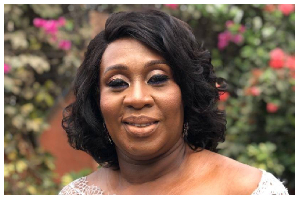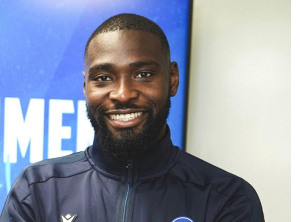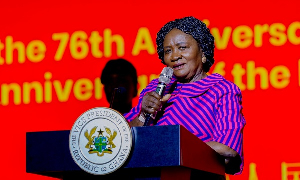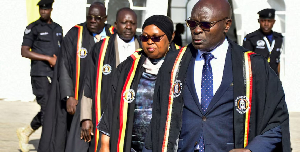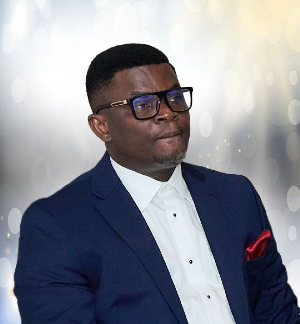In this discourse, I wish to discuss the legacy of former president Jerry John Rawlings, commencing with his explosion from oblivion to national attention in 1979; continuing with his “second coming” in 1981; and concluding with his “metamorphosis” from a military dictator to a democratically elected leader of Ghana in 1992, and his eventual re-election in 1996. In his eight years as president, Jerry Rawlings became a transformed man, jettisoning some of the fire-spitting rhetoric and scorching invectives that had characterized his personality prior to 1992, and turning on the charm to woo foreign investors, after the former experienced an epiphany ? Rawlings had, at some point, realized that Ghana could not grow economically unless his administration’s Marxist-Leninist leanings were shunned in favor of a free-market system, and the latter’s associated concept of private ownership of property.
The arrival of Rawlings on Ghana’s political terrain in 1979 has been written about at length, but I do intend to elucidate some notable issues relevant to this discussion. It is a known fact that this putschist ? and his coterie of “rebels” ? killed three former heads of state and other senior military officers, but whether or not the punishments meted out to the former heads of state were disproportionately stern is, of course, still hotly deliberated in contemporary times. To argue that the trials of these men were fair is discomfiting and preposterous, for in their fervor to turn the tables on these former leaders ? the Akuffo-led military government had Rawlings and his accomplices facing charges of high treason for the bungled May 15, 1979, uprising ? Rawlings and his cohorts wasted no time in unleashing the worst atrocities on their fellow citizens, mayhem never before known in the history of this peace-loving nation.
While a large segment of the Ghanaian population welcomed the change in government in 1979, there were those who exhibited great caution in their adulations, for the regime was, matter-of-factly, lacking in constitutional legitimacy. The regime, in its rush to “right” many wrongs, summarily forced traders and farmers to sell their goods at obnoxiously low prices. And according to Robertson (1983), as an example of the ineptitude of these soldiers, the popular Makola market in Accra was razed to the ground for no justifiable reason by these recalcitrant and self-serving soldiers, amidst other horrors. So, why destroy the market when the traders could simply have been made to conform to the new rules of the junta? How did the destruction of the market make sense economically? Was it an attempt to exorcise some unknown spirit or force?
BBC News (2000) described the members of the Armed Forces Revolutionary Council (AFRC), as “mostly a pack of stoned and brutal idealists with Rawlings as its Chairman. The desperate masses hailed him as Hero, Lord, Saviour, Junior Jesus. Thus empowered, [Rawlings] had eight generals executed.” Referring to any mortal man as savior or lord or Junior Jesus is, indeed, heretical, at least from a Judeo-Christian perspective, and Rawlings should have denounced these hallucinatory proclamations by the masses from the start, for Rawlings simply supervised a brutal regime that was the most intolerant in the history of the nation. I prefer to not remind readers about the open humiliation our mothers, sisters, brothers and fathers had to endure when many were publicly flogged like dogs on decrepit wooden benches, amidst the superficial and wanton jubilations of fellow citizens who were probably next in line to disappear in the middle of the night!
Bestowed with the charisma of a preacher rather than a dictator, Rawlings roared back onto the political stage in December 1981, deposing Hilla Limann, a constitutionally mandated leader, the very person to whom the former had relinquished power in 1979, and setting up the Provisional National Defense Council (PNDC). Saaka (1994) remarked: “[Rawlings’] dramatic presence, his flamboyance, his dynamic oratorical style, the essence of his mode of leadership was remarkably reminiscent of what was considered, by many, as ‘the good old days’ of strong and active Nkrumaist politics.” Alluding to a cacophony of reasons for his “second advent,” Rawlings and his cabal continued from where they left off in 1979: They masqueraded as the new saviors, blaming the Limann administration for not finding a “quick fix” to the nation’s socio-economic woes! So, why did Chairman Rawlings turn around to tell a group of journalists during his second taste of illegitimate power, as reported by BBC News (2000), that “Don’t ask me about ideology or economic programme. I don’t know any law and I don’t understand economics, but I know it when my stomach is empty?” So then, what was really the justification for the overthrow of the popularly elected government of Dr. Hilla Limann?
Soon after the 1981 overthrow of Limann’s administration, Rawlings “suspended the constitution, banned political parties, detained party leaders, and took a number of extra-legal actions” (Gyimah-Boadi & Rothchild, 1982). Establishing quasi-military and extra-legal institutions, such as the People’s Defense Committees (PDCs), Workers’ Defense Committees, Citizen Vetting Committees (CVCs), and tribunals, Rawlings would trample on the rights of many Ghanaians, repressing their right to due process and stagnating the rule of law in the country. The CVCs, for instance, were tasked with scrutinizing the assets and bank accounts of citizens with 50,000 cedis or more in their accounts. While Nkrumah, Kotoka, Busia, and Acheampong all curtailed civil liberties while in office, Rawlings’ military regimes carried out the most dastardly civil abuses, as delineated earlier.
With the establishment of tribunals came the absurd explanation that such tribunals were in place to provide jurisprudential services alongside the regular courts. Wanting to circumvent the occasional bottlenecks found in the legal system ? these steps are deliberately built into any legitimate system of jurisprudence to safeguard against abuses ? an impatient Rawlings declared that “these tribunals would ‘not be fettered by technical rules which have in the past perverted the course of justice and enabled criminals to go free’” (Gyimah-Boadi & Rothchild, 1982). Conversely, angered by Rawlings’ deliberate and stolid attempt to destroy the nation’s legal apparatus, the Ghana Bar Association fought back ? and rightly so ? to halt this assault on the nation’s legal system, which resulted in a lot of hostility between both parties. Two of some of the strangest punishments handed down by these tribunals, depicting the complete abuse of legal authority, were those meted to Okutwer Bekoe III (he had to carry human excreta for a while as part of a shockingly degrading verdict) and the head teacher of a rural primary school (he was flogged in front of his pupils!). What insanity!
But perhaps, the greatest indictment of the Rawlings-led PNDC is the yet-to-be-solved murders of the three High Court judges (one was female) and a retired army officer on June 30, 1982. One convincing theory has, over the years, been put forth to explain the murders: Some PNDC apparatchiks were disillusioned with the retired army officer because the latter had personally engineered the firing of a number of GIHOC employees with ties to the government. When these GIHOC employees appealed to the High Court, the female judge, who heard the case, upheld the firings, leading to mass hysteria among the employees. At any rate, while Rawlings himself was absolved of any crime, these unsolved murders will remain a dark blot on the PNDC’s swathe of achievements.
In addition to the condemnations leveled against the PNDC by the Ghana Bar Association, Christian institutions also played pivotal roles in exerting pressure on the despotic government to curtail its abuse of power. In November 1982, the Catholic Bishops Conference questioned the regime’s decision to hold on to power indefinitely, and asked its leaders to return the country to democratic rule. This august Christian body also reminded the government of the need to allow the constitutionally mandated courts to continue to be the only arbiters of justice and jurisprudence in the nation. As the church pursued “its two educational goals, namely, the political education of the masses through seminars and its prophetic role as the conscience of society” (Yirenkyi 2000), it remained a voice for the masses in those dark days, and has continued to do so up to now.
With the impending collapse of the Soviet Union and the futility of Marxist-Leninist ideology in solving the nation’s socio-economic woes, Ghana had no choice but to turn to the West for assistance. And grudgingly, the PNDC agreed to reform its economic policies, partially culminating in the government’s willingness to hold multiparty elections in 1992. Taking off his military uniform, Rawlings created legitimacy for himself when he participated in and won the 1992 elections. It is this post-1992 Rawlings that most people have great admiration for, as his other stints in the nation’s top seat were via coercion and authoritarianism! Counting on his charisma and capacity to captivate large audiences, Rawlings was re-elected in 1996 to serve a second four-year term.
The visit by Bill Clinton, former president of the United States, to Ghana in early 1998 came to crystallize, to a large extent, Rawlings’ recognition as a modern democrat by powerful Western nations. Prior to the visit, Africa’s problems were brought to the fore when Samuel Berger, Clinton’s national security advisor at the time, expatiated: “We have to demystify Africa for Americans. We have a one-dimensional view of the ‘Dark Continent’ and there is a sea [of] change going on there” (Washington Post, 1998). And in a speech delivered by Madeleine Albright, then U.S. Secretary of State, at George Mason University a week prior to Clinton’s protracted visit to Africa, she reminded her listeners: “A new generation of Africans has come of age raised in the era of independence, liberated from Cold War divisions and determined to assume an equal place at the world table” (Washington Post, 1998). As long as African nations are willing to continue on the path of democratization, they will find willing partners around the globe in the fight against tyranny and one-man dictatorships, for people everywhere are yearning to be free, to determine their own destinies, and to freely choose their own leaders. The events in Kenya are a microcosm of what harm tyranny and the violation of basic human principles can cause a nation, and Ghanaians, without a doubt, would take a cue from the Kenyan imbroglio.
In February 1999, approximately one year after Clinton’s visit to Ghana, there was a reciprocal visit by Rawlings and his wife to the White House. With nothing but solid praise for the Ghanaian leader ? many of us agreed wholeheartedly with Clinton ? Bill Clinton lauded his guest: “Mr. President, under your leadership, Ghana has continued to flourish. It remains a vivid example of what democracy and open markets can do for the African people. Over the past 5 years, your economy has grown steadily. You have an independent judiciary, a lively Parliament, a thriving civil society.” Moreover, reflecting on the changes that were taking place on the political landscape in Nigeria, Bill Clinton further opined: “Something else of far-reaching importance is happening in Africa, something unthinkable [in 1998] when I visited Ghana. Three days from now, there will be a democratic Presidential election in Africa’s most populous country, Nigeria. For 28 of its 38 years of independence, Nigeria has been run by military dictators. Now it has a chance to start anew.”
Without a doubt, Rawlings’ administrations of 1992 and 1996 chalked some salient foreign policy objectives. The government of Ghana, in conjunction with the Economic Community of West African States Monitoring Group (ECOMOG), provided troops to help calm tensions in Liberia and Sierra Leone; was a partner in the Africa Crisis Response Initiative; and regularly supplied peacekeepers to perennial trouble spots, such as Lebanon and former Yugoslavia. Moreover, Ghana’s fledgling ? but flourishing ? democracy in 1999 was a beacon of hope for her giant neighbor, Nigeria, as the latter was dealing with the conundrum of political transition from military despotism to multiparty democracy, with the eventual election of Olusegun Obasanjo as president in 1999. And Obasanjo would later be re-elected in 2003 to a second term, just like Jerry Rawlings. Today, Nigeria, like Ghana, has successfully transitioned from one democratically elected government to another, a first for that nation, with the 2007 election of Umaru Yar’Adua as president.
In conclusion, Jerry John Rawlings has been, sort of, an enigma on the Ghanaian political terrain for more than 20 years. And presently, Rawlings remains a larger-than-life figure in Ghanaian politics, even though he has been out of office for almost a decade. While Rawlings’ emergence on Ghana’s complex political terrain in 1979 led to untold horrors and abuse of power, and while Rawlings’ additional forays into governance in 1981 were gratuitous and duplicitous, his eventual “transformation” into a civilian leader finally brightened his legacy in his home nation and abroad. As a modern statesman, the Ghanaian strongman must continue to promote democracy and freedom in his own country, as well as other troubled spots around the globe. Soon, Ghana will be fortunate to have two ex-presidents, and the nation must forgive their “sins” and embrace them unreservedly.
Please note: In a previous article on interethnic marriages, I erroneously mentioned that the Akan population in Ghana was 75%. The true figure is about 45%. I apologize for the error.

Views expressed by the author(s) do not necessarily reflect those of GhanaHomePage.


